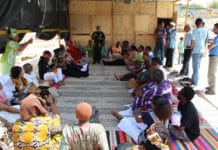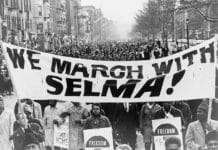Ethiopian émigrés say they will no longer do reserve duty in the Israel Defense Forces, alleging racial discrimination by numerous state agencies, including the police.
by David Sheen

Since September, over three hundred Black Jews have announced their intention to refuse any military order to report for reserve duty, accusing the Israeli government of state-sponsored racism against citizens of Ethiopian origin. The soldiers, who include fighters from all Israel Defense Forces infantry brigades, as well as some of its most specialized commando units, say that as long as the state does not respect their civil rights, they will in turn refrain from fulfilling their civic obligations.
In July, the San Francisco Bay View reported on renewed rallies by the Ethiopian community in Israel. Spontaneous demonstrations in Jerusalem, Tel Aviv and other locales across the country beginning in the spring of 2015 catapulted the community and its concerns about state racism back into the national conversation. But protest leaders say that the government’s failure since that time to adequately address their long list of grievances has forced them to ramp up their struggle and take what they are referring to as “extreme measures.”
The soldiers say that as long as the state does not respect their civil rights, they will in turn refrain from fulfilling their civic obligations.
“We have no choice. If we didn’t do it, no one would notice us,” says Avishai Malson Tzaghon, a spokesperson for the new Ethiopian refuseniks.
This 12-part interview is with Avishai Malson Tzaghon and Jajaw Bimro, two of the hundreds of Jewish Israelis of Ethiopian origin who are refusing to do army reserve duty because of institutional racism against their community. All 12 parts can be found as individual videos at the end of the article.
Without rights, ‘don’t bother talking to us about obligations’
Tzaghon, who hails from Ramle, and Jajaw Bimro, who lives in Rehovot, are two of the three-hundred-plus Ethiopian-Israelis who have put the Israeli army on notice, vowing to ignore any summons they receive. Earlier this month, over coffee at a community center in the town of Lydda, Tzaghon, 35, and Bimro, 30, explained to the San Francisco Bay View their reasons for serving in the Israeli military up until now, and their reasons for refusing to do so any longer.
“Some of our relatives walked on foot for great distances via Sudan. Many people died along the way. Men, women and children. In order to get to the Land of Israel. In order to get to Jerusalem,” says Bimro. Just as Ethiopian Jews were willing to make supreme sacrifices in order to relocate to Israel in 1980s, so were they similarly motivated to send their sons and daughters to the military soon after their arrival. “We enlisted out of a sense of purpose, coming from the home. We believe in the state of Israel,” Bimro says.
But three decades after Ethiopian Jews were first permitted to immigrate to Israel, Tzaghon and Bimro say that the state has voided its social contract with the community. “As long as the policy of discrimination and exclusion and disparaging treatment towards Ethiopian émigrés does not change,” says Bimro, “don’t bother talking to us about doing reserve duty.”
“As long as the policy of discrimination and exclusion and disparaging treatment towards Ethiopian émigrés does not change,” says Bimro, “don’t bother talking to us about doing reserve duty.”
Tzaghon agrees, noting that the Ethiopian enlistment rate is measurably higher than for white Jewish-Israelis: “We served in the best possible units. We gave our maximum in the army. We served as officers. We signed on for extra years of army service,” he says. “But on the other hand, in our private lives, our rights aren’t just crushed – they don’t even exist. So let me get this straight: If my rights don’t exist, why should I have to do reserve duty?”
‘The army is a sacred cow – so let’s slaughter that cow’
In Israel, army enlistment is mandatory for able-bodied 18-year-olds; Jewish men serve for three years and Jewish women serve for two years. Religious Jews can secure exemptions, with the proviso that they instead spend those years studying in a religious seminary. In previous decades, few secular Jews dodged the draft, but in recent years, a significant proportion of the population – 28 percent of men and 42 percent of women – has avoided conscription in one way or another. Few of these refusers announce their actions publicly, turning their personal decision into a political protest.
Though many state institutions – including the legislative, executive and judiciary wings of the government – are held in poor regard by Israelis of all stripes, the army has retained its almost sacred status in the eyes of the vast majority of Jewish citizens. As such, the call to sidestep military reserve duty has proven unpopular, even amongst Ethiopian-Israelis perturbed by the prevalence of racial discrimination in Israel.
“They believe that the army is a sacred cow, untouchable. So I say: ‘The army is sacred? What about me? What about our poor bodies? Our bodies are sacred!’” cries Tzaghon. “‘The army is a sacred cow’ – this is not a slogan of immigrants, but of the country’s hegemonic rulers. So let’s slaughter that cow. Let’s slaughter it. Nothing is sacred! All that’s sacred is my liberty and my body. And when I have no liberty, and my body is a punching bag for the police, whenever they feel like it, then we have a problem.”
The call to sidestep military reserve duty has proven unpopular, even amongst Ethiopian-Israelis perturbed by the prevalence of racial discrimination in Israel.
“All those of us who signed the document know that the army can decide that we’ve gone AWOL and jail us. We are ready. This is not only a protest of words. We have no problem going to jail. We will go to jail. We will continue the struggle. We will intensify the struggle. We are ready to go to jail, to do whatever it takes,” says Tzaghon. “Some of us are married with children. We have jobs. We have a lot to lose if we go to jail. But on the other hand, what are our lives worth if we don’t fight for them?”
Societal racism is bad, systemic racism is worse
Tzaghon and Bimro say they are saddened by race-based discrimination from their fellow Jews, which they claim is commonplace. Ethiopians are told by white business owners that they have no positions to fill and by white landlords that they have no apartments to rent, only to observe white people swooping in immediately afterwards to scoop up these opportunities, say Tzaghon and Bimro.
And Israeli racism doesn’t only hide behind a mask of tolerance; it can be regularly observed in public places, directed at Black folks of all ages, they say. “People will look at me disparagingly; we Ethiopians recognize that look. Recognizing that look is a survival instinct for us,” says Tzaghon. “We are very alert to it. I’m an adult, but even young children recognize it.”

Tzaghon describes petty racism as a scourge upon society, but one that he is able to endure. What is insufferable, he says, is the systemic racism that permeates the institutions of the Israeli state. “Our struggle is not against ordinary folk. Ordinary folk can learn. Or maybe they won’t learn – but I’m going to continue living my life regardless. But when the racism is institutionalized – in the Ministry of Education, the Ministry of Justice, the police etc. – then I can’t really live my life. I’m in survival mode.”
Bimro echoes Tzaghon’s disappointment. “We expected the state to be different. That there would not be racism,” he says, and then proceeds to list a litany of charges against the Israeli government.
“That they would accept children at schools, and not forbid them from entering. That the Health Ministry would not give Depo-Provera shots to our mothers, in order to reduce the number of children that Ethiopians give birth to. That the Health Ministry would not throw out blood donated with good intentions, thinking that their blood will go to save the life of a fellow Jew, when as soon as the donor of Ethiopian origin leaves, they just throw it into the garbage,” laments Bimro.
Bimro echoes Tzaghon’s disappointment. “We expected the state to be different. That there would not be racism,” he says.
“As long as we see these things, supported and encouraged by the state, whether passively or actively, then don’t bother talking to us about obligations,” he says.
Israeli police harass Black youth, say striking soldiers
Relegating Ethiopian émigrés to impoverished neighborhoods and streaming them into underperforming schools has severely impeded the community’s economic potential, say Tzaghon and Bimro. But the grievance that has stirred up their antagonism more than any other is what the refuseniks describe as constant police harassment.
“When you walk down the street, you don’t feel [safe]. At any time, a police officer or a police cruiser could come by, and you could end up arrested, accused of something ridiculous. And your life is ruined,” says Bimro. “Those police officers who feel very comfortable using their taser-guns on Ethiopian émigrés, to use their pepper-spray, to raise their voices, to approach us arrogantly, in a patronizing manner, to speak disparagingly to citizens who pay their salaries, who give them money so they can buy food for their children and pay their rent or their mortgage. It’s totally insane.”
Ethiopian organizers planned the soldier strike over the course of the summer, but had not originally intended to announce it in early September. At the end of August, though, Israel’s Police Chief Roni Alsheikh publicly asserted that immigrants had higher crime rates, and that it was therefore natural for police officers to treat them with suspicion. The controversial statement sparked an immediate protest outside the home of the police chief and convinced Ethiopian organizers to go public with their protest as soon as possible.
“When you walk down the street, you don’t feel [safe]. At any time, a police officer or a police cruiser could come by, and you could end up arrested, accused of something ridiculous. And your life is ruined,” says Bimro.
“Their perception is that Ethiopian émigrés are suspect, at all times, in all places, in all situations,” says Bimro. “The police chief himself said that it is natural to suspect Blacks. He essentially justified the violence and the disparaging, patronizing, arrogant attitude of police who patrol the streets and chase little children, jailing them, ruining their lives with trumped-up charges.”
Bimro knows of what he speaks. After a series of harrowing encounters with law enforcement officers, he set out to prove that he and his fellow Ethiopian-Israelis were being over-policed for racist reasons.
One day in 2015, Bimro and a group of friends, all Black, decided to carry on a casual conversation on a public bench in the affluent north Tel Aviv neighborhood of Tsehelah. In short order, several police cars converged on their location, frisked the Ethiopian men and put Bimro in the back of their cruiser. Just before he was removed from the area, a camera crew emerged from the bushes, capturing the cops red-handed. The police promptly released Bimro on the spot, but that experience and many others left a bad taste in his mouth.
“We demand to be free of the worry that something like that can happen. To be able to walk down the street with confidence. And to feel that the job of the police is to defend me, to protect me, and to provide services when I require them.”
First-ever call-out for international allies
The refusenik rebellion is the first known protest by Ethiopian-Israelis to consciously look outward, seeking the solidarity of the international community. Tzaghon says this is because they now realize that Ethiopians only account for a tiny proportion of the population, and lack leverage with the Israeli government.
“We have no political influence. We have no economic influence. We have no lobby. We don’t have enough power to change things. Because if we did, then the government would have changed things long ago. The only thing we can do is show other democratic countries what’s happening here, so they will pressure the state of Israel,” he says.
Bimro agrees and specifically mentions African Americans as potential allies who they hope will take up their cause. “The Black communities should use their power to put pressure on the Israeli government to change its ways. So it will treat Ethiopians as citizens with equal rights,” adds Bimro.
“The Black communities should use their power to put pressure on the Israeli government to change its ways. So it will treat Ethiopians as citizens with equal rights,” adds Bimro.
U.S. Jews should also speak out and augment the voices of Ethiopian-Israelis, says Tzaghon, and not content themselves with financial contributions to NGOs who claim to aid the community. “Stop giving us donations! We don’t need donations! We need equal opportunities!
“If good-hearted Jews really want to help Ethiopian émigrés, then don’t help us with money, help us with our struggles. Tell the Israeli government that you heard that our community suffers from racism. Ask them questions,” he says.
If the refuseniks’ message makes its way to these shores, it may find a receptive audience amongst U.S. Jews. It was in large part thanks to the intervention of Jewish American activists that the Israeli government eventually agreed to allow Ethiopian Jews into the country in the mid-1980s, after decades of deporting those who had managed to make it in on their own steam.
‘I only wish that I could care about politics’
But Ethiopian-Israeli efforts to recruit American Jewish allies are being hamstrung by a mainstream media blackout. As of this writing, only two brief English-language articles have been published about the strike: one on an Israeli news site and the other in Newsweek, quoting that same Israeli news site. American outlets have hesitated to publish reports about Israeli racism towards other communities of color, such as the African Hebrew Israelites and African refugees.
Enlisting the aid of politically aligned African Americans may prove to be even more daunting. While Black American zionists avoid mention of the Ethiopian protests, to help protect Israel from criticism, radical Black activists in the U.S. have been strengthening ties with Palestinians and increasingly adopting the position that Israel bears the lion’s share of the blame for their conflict. Some of them might accuse Ethiopian Israelis of complicity in a zionist zero-sum war for control of the Holy Land and make explicitly repudiating the ongoing dispossession of Palestinian people a condition for vocal support in their struggle against state racism.
For now, Tzaghon prefers to focus on the community campaign, avoiding the Middle-East’s most mine-laden battleground. “I only wish that I could care about politics! If I cared about politics, about the Israeli-Palestinian conflict, it would mean that my own situation in Israel is good enough for me to be able to.
“But my situation isn’t good enough for that. I’m still stuck in my own niche; I’m not there yet,” says Tzaghon. “There is what I think about: Tomorrow morning, on the way to my car, will a cop hit me over the head? My life is about day-to-day survival. When we start dealing with other issues, it means our situation has improved,” he says.
“I only wish that I could care about politics! If I cared about politics, about the Israeli-Palestinian conflict, it would mean that my own situation in Israel is good enough for me to be able to. But my situation isn’t good enough for that. I’m still stuck in my own niche; I’m not there yet,” says Tzaghon.
Bimro says he is still sympathetic to the state, but is unwilling to do its bidding, as long as Black Jews are treated like second-class citizens. “We need to be in the army, to continue to serve, to contribute to the country.
“But we are not this country’s scapegoats, and we are not willing to be this country’s cannon fodder, where on one hand we do army reserve duty, and on the other hand, police pounce on us in back alleys and put us in cruisers,” says Bimro. “It’s insane, but it’s our reality.”
David Sheen is an independent journalist based in Dimona, Israel. His website is davidsheen.com and he tweets from @davidsheen.
Playlist with all 12 parts
Individual videos for each part:
1) Saying no to the Israeli army
2) How the protest began
3) Breaking with Israeli consensus
4) Recognizing racism
5) No more naiveté
6) On police harassment
7) List of demands
8) On social integration
9) Solidarity not charity
10) On African refugees
11) Lessons from Palestinians
12) On charges of leftism

 Store
Store








